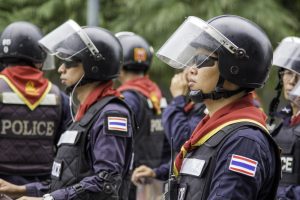On a Thursday afternoon in June last year, Sitanun Satsaksit was chatting on the phone with her brother Wanchalearm as he was walking down a small street in front of his apartment in Cambodia’s capital Phnom Penh. A high-profile activist back home in Thailand, he had fled the country to escape arrest on trumped-up charges in 2014. Suddenly, Wanchalearm was dragged into an SUV by men wearing black clothes – the last thing his sister heard him say was: “I can’t breathe.” He has not been seen since.
Sitanun, who was never particularly politically active before, has since become a tireless campaigner for her brother and others who have been “disappeared,” demanding justice and answers. Instead of helping her, however, Thai authorities have treated her like a criminal. Last week, police brought charges against her after she spoke at a protest. Sitanun could face years in prison if found guilty.
Sadly, these cases are far from uncommon, but part of a much broader crackdown on dissent in Thailand.
Apart from Wanchalearm, or “Tar” as his friends called him, at least eight other exiled Thai activists have been disappeared in recent years. Two of them were found dead in Laos in early 2019, their bodies stuffed with concrete before they were thrown in a river. None of the cases has been solved, as police investigations have been marked by delays and plain disinterest.
Similarly, Sitanun is just one of hundreds of dissidents who have faced blatantly politicized criminal charges in recent years. The current government, which came to power in deeply flawed elections in 2019 after the coup d’etat in 2014, is still closely tied to the junta that preceded it and has kept many of the military regime’s oppressive tactics alive.
In 2020, mass protests against the government swept Thailand as university and high school students took to the streets to demand democratic reform and respect for human rights. These protests have since grown to include people frustrated with the government’s mishandling of the COVID-19 pandemic and resulting economic crisis. With COVID-19 cases surging in Thailand this year, many have started gathering in socially-distanced “car mobs” to voice their anger.
Dozens of high-profile activists and protest leaders have been charged or imprisoned. Authorities rely on a range of oppressive laws that criminalize speech both online and offline to harass critics. These include the notorious Section 112 of the Penal Code, the lése majéste provision that criminalizes defamation of the royal family. A conviction under Section 112 can bring up to 15 years in prison. More than 150 people – including politicians, journalists, and social media users – have been charged under Section 112 just in the past year.
Ordinary protesters and social media users are also at risk, including children. Scores of students and youth, many of whom joined protests in their school uniforms, have been targeted by police and could face prison time for nothing but voicing their opinions peacefully. In August, one 13-year-old was arrested in central Bangkok after taking part in a demonstration.
As the director of a prominent human rights NGO, I myself have also been targeted many times. Most recently, on July 4, I spoke at a rally to mark the anniversary of Wanchalearm’s disappearance. I was – somewhat ludicrously – charged with a traffic violation because our demonstration had blocked a street in downtown Bangkok. When I refused to fingerprint the police report, the officer added an “obstruction of justice” charge for good measure. Very often these cases are filed simply to harass, but there is also a real risk that I could end up in jail. In fact, in 2017, I barely escaped prison time when the military sued my organization after we published a report on torture.
This crackdown on peaceful criticism of the government must end. It is high time that Thai authorities realize that this is an issue that cannot be solved by simply throwing people in jail. The new generation, empowered with universal values, are not going to stop demanding their democratic and human rights. The government must work together with activists to build a truly inclusive society, where everyone’s opinions are respected.
In the short term, all those arbitrarily detained must be released, and the legal code must be reformed to stop criminalizing peaceful speech. A huge step in the right direction would be to approve and enforce the law on torture and enforced disappearances the parliament is currently debating. But we must also address systemic issues in our society. Too often in Thailand, “rule of law” simply means that institutions work to protect the powerful as they exploit those without the same means.
Next month, Thailand is preparing to open its borders to visitors again. This is a good thing: the Thai economy is hugely dependent on tourism, and the pandemic has taken a devastating toll, driving hundreds of thousands more into poverty. While I hope that many people will visit, I urge them to do so with their eyes open. Thailand might be the “land of smiles” and have some of the world’s best beaches, but there is a dark side to our country too. Nowhere in the world should people like Sitanun risk being thrown in prison – she is merely a heartbroken sister trying to find answers, and prevent what happened to her brother from happening to other families.

































